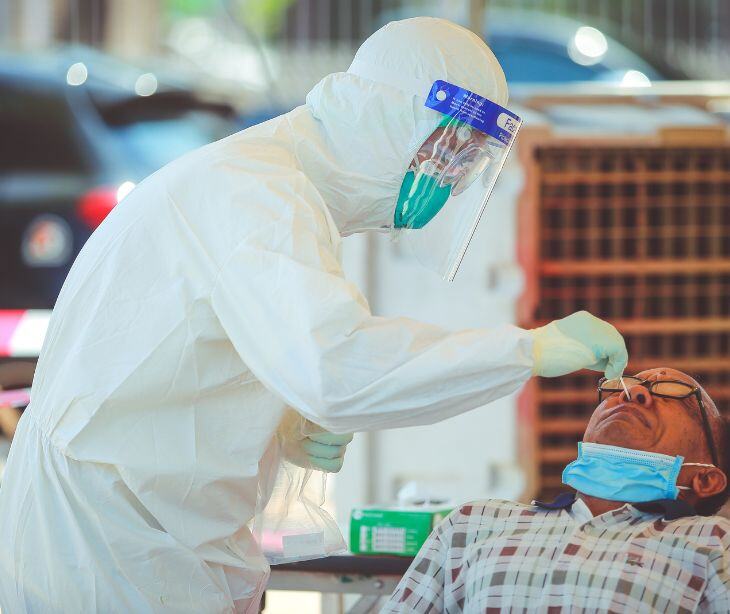4 min read
Breaking confidentiality during public health concerns
Tshedimoso Makhene
Oct 7, 2024 7:12:02 AM

During public health crises, the ethical obligation to maintain confidentiality can come into conflict with the need to protect the wider population from harm. Striking a balance between individual privacy and public safety creates complex legal, ethical, and practical challenges.
Confidentiality in healthcare
Confidentiality in healthcare refers to the obligation of healthcare providers to keep a patient’s personal health information private unless the patient consents to its disclosure. This concept is both a professional standard and legally enforced through laws such as the Health Insurance Portability and Accountability Act (HIPAA) and the General Data Protection Regulation (GDPR).
The rationale behind confidentiality is clear: it ensures that patients feel safe sharing personal and sensitive information with their healthcare providers, which ensures accurate diagnosis and effective treatment. Without this assurance of privacy, patients may withhold critical information, compromising their care.
However, there are circumstances where maintaining strict confidentiality might conflict with the duty to protect public health. For instance, during an outbreak of a highly infectious disease, healthcare providers may need to share patient information with public health authorities to prevent the spread of the disease.
See also:
Ethical principles guiding confidentiality
Healthcare professionals are guided by a set of ethical principles when making decisions about confidentiality. The most relevant of these include:
- Beneficence: The obligation to act in the best interests of the patient and to promote their well-being.
- Non-maleficence: The obligation to avoid causing harm to the patient.
- Autonomy: The right of patients to make decisions about their own health and to have their choices respected.
- Justice: The obligation to treat patients fairly and to distribute healthcare resources equitably.
When faced with a situation where breaking confidentiality might protect public health, healthcare providers must weigh these ethical principles carefully. Beneficence and non-maleficence suggest that preventing harm to the public might justify breaching confidentiality, while respect for patient autonomy and privacy would argue against it.
Legal obligations in public health emergencies
According to MedlinePlus, “all US states have a reportable diseases list. It is the responsibility of your provider, not you, to report cases of these diseases. Many diseases on the list must also be reported to the CDC.”
For example, in the United States, HIPAA allows for the disclosure of patient information without consent when it is necessary to prevent or control disease, injury, or disability. Similarly, the GDPR includes exceptions for the processing of personal data in the context of public health emergencies, such as pandemics.
Healthcare providers may also be required to disclose information to protect third parties from harm. For instance, if a patient is diagnosed with a communicable disease such as tuberculosis or HIV, the healthcare provider may be obligated to notify individuals who have been in close contact with the patient, even if the patient does not consent to this disclosure.
These legal obligations are intended to strike a balance between protecting individual rights and ensuring public safety. However, they raise important ethical questions about how much information should be disclosed, to whom, and under what circumstances.
When is breaking confidentiality justified?
The decision to break confidentiality should never be taken lightly. It requires careful consideration of both the potential harm to the patient and the potential benefit to public health. Here are some key scenarios where breaking confidentiality may be justified:
- Communicable disease reporting: Many countries have laws that mandate the reporting of certain communicable diseases, such as COVID-19, tuberculosis, and HIV. In these cases, healthcare providers are required to notify public health authorities to help track and control the spread of disease. While this may involve disclosing patient information, it is generally considered an acceptable breach of confidentiality due to the public health risk.
- Contact tracing: During outbreaks of infectious diseases, contact tracing helps in controlling the spread of the virus. This process often involves identifying individuals who have been in close contact with an infected person and notifying them that they may have been exposed. In some cases, this may require disclosing the identity of the infected person, although efforts are usually made to minimize the amount of personal information shared.
- Imminent threat to others: If a patient’s condition poses an imminent threat to the health or safety of others, healthcare providers may be justified in breaking confidentiality. For example, if a patient refuses to disclose their HIV status to a sexual partner, a healthcare provider may be required to inform the partner to prevent transmission of the virus.
- Pandemic response: During large-scale public health crises such as the COVID-19 pandemic, governments and public health agencies may implement emergency measures that allow for the disclosure of personal health information. These measures are typically temporary and are intended to facilitate contact tracing, vaccination campaigns, and other efforts to control the spread of the disease.
Read also: When can confidentiality be broken?
Balancing ethical considerations
In situations where breaking confidentiality is justified, healthcare providers must strive to balance the competing ethical principles of beneficence, non-maleficence, autonomy, and justice. Here are some key considerations when making these decisions:
- Minimize harm: While it may be necessary to disclose patient information, healthcare providers should aim to minimize the harm caused by the breach of confidentiality. This may involve disclosing only the minimum amount of information necessary to protect public health and limiting the number of individuals who have access to this information.
- Transparency: Whenever possible, healthcare providers should inform patients when their information will be disclosed and explain the reasons for the breach of confidentiality. This helps to maintain trust between patients and providers, even in difficult circumstances.
- Public interest vs. Individual rights: Providers must carefully weigh the public interest in disclosing information against the individual’s right to privacy. In some cases, the potential harm to the public may be so significant that it justifies a breach of confidentiality. In other cases, the harm to the individual may outweigh the public health benefit.
- Proportionality: The decision to break confidentiality should be proportionate to the level of risk. For example, a minor risk of transmission may not justify a significant breach of confidentiality, while a high risk of transmission during a pandemic may warrant more extensive disclosures.
See also: Understanding permissible disclosures in an emergency
FAQs
What types of information can be disclosed during a public health emergency?
During a public health emergency, healthcare providers may be allowed to disclose information such as a patient’s diagnosis, contact information, and the identity of people they may have exposed to the disease. However, the amount of information disclosed should be the minimum necessary to protect public health.
Can a patient refuse to allow their information to be shared during a public health emergency?
In most cases, if there is a significant risk to public health, patients cannot refuse to allow their information to be shared. For example, laws often require healthcare providers to report certain communicable diseases to public health authorities, regardless of the patient’s wishes. However, patients should be informed about the disclosure whenever possible.
What happens if confidentiality is broken inappropriately?
Inappropriate breaches of confidentiality, where patient information is disclosed without a valid reason, can result in legal consequences for the healthcare provider, including fines, lawsuits, and loss of professional licenses. The patient’s trust in the healthcare system can also be severely damaged.
See also:



%20(35)-1.jpg)
%20-%202024-10-24T153236.778.jpg)